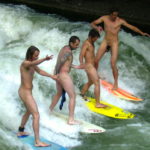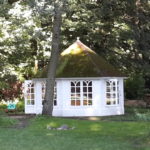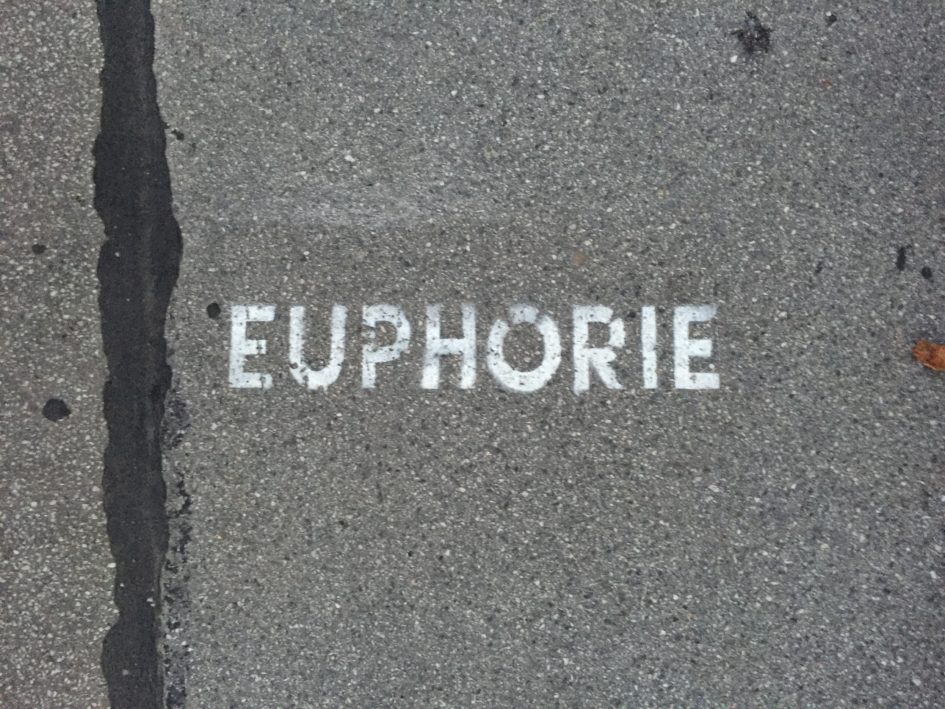 When I move to Atlanta for my college years, it is pure chance that the Georgia Tech campus and the center of gay life for the whole Southeast are both located in Midtown. An unfortunate coincidence, however, is AIDS hitting the news headlines just as I begin finding the courage to come out of the closet. Nevertheless I search for belonging within my gay tribe, but I’m not sure I can fit in. Having lived most of my tween and teen years in rural North Carolina, I learned how to be normal, bland, and WASPy. Could I warp myself into a young homo with approval from those that preceded me? Once inside the gates of gay culture, dancing to It’s Raining Men by The Weather Girls, I discovered that having the right clothes, the right body and a hot man are not enough. Credibility comes from instantly recalling iconic celebrities from cult films like Sunset Boulevard and The Women, reciting Joan Crawford’s lines from Mommie Dearest, and camping it up with 1930s glamour like Rosalind Russell in a scene from Auntie Mame. Her zest to live boldly makes everyone feel good, and the Manhattan diva inspires countless gay men to blossom into their full fabulousness.
When I move to Atlanta for my college years, it is pure chance that the Georgia Tech campus and the center of gay life for the whole Southeast are both located in Midtown. An unfortunate coincidence, however, is AIDS hitting the news headlines just as I begin finding the courage to come out of the closet. Nevertheless I search for belonging within my gay tribe, but I’m not sure I can fit in. Having lived most of my tween and teen years in rural North Carolina, I learned how to be normal, bland, and WASPy. Could I warp myself into a young homo with approval from those that preceded me? Once inside the gates of gay culture, dancing to It’s Raining Men by The Weather Girls, I discovered that having the right clothes, the right body and a hot man are not enough. Credibility comes from instantly recalling iconic celebrities from cult films like Sunset Boulevard and The Women, reciting Joan Crawford’s lines from Mommie Dearest, and camping it up with 1930s glamour like Rosalind Russell in a scene from Auntie Mame. Her zest to live boldly makes everyone feel good, and the Manhattan diva inspires countless gay men to blossom into their full fabulousness.
I’m a bit bewildered, but I do my best. I find a tribe, but mainly I just watch my friends dress up and become a parade of characters that resemble our rebellious 80s pop heros, or at least regular scenesters. I decide that the road to becoming invisible had been hard enough, and trying to become the local version of Simon LeBon or Robert Smith is too exhausting. I enjoy the parties and the drugs however. In the 80s, we were 20-something hipsters chasing a selfish, drug-induced, high-fashion life of consumption and loving it.
The consequences of my actions didn’t seem that bad, especially if I couldn’t fully feel the results.
 By the time the 90s roll in, we see ourselves on TV, in Absolutely Fabulous, as Edina and Patsy strive to live their 20s while in their 40s. As slapstick as the show is, the irony helps show how we cleverly, and mindlessly adapt to shifting cultural trends and norms. And we do it again and again as we try to succeed in life. Age 42 was a point of reflection for me, and seeing signs of “maturity” in the bathroom mirror made me wonder: am I just the result of consumerist, gay culture or can I live authentically? Perhaps it’s a positive turn that the mid-life crisis has become a remedy for reconciling the persona, formed in a culture that insists on measuring material success, with the soul we deeply know we’ll need to recover.
By the time the 90s roll in, we see ourselves on TV, in Absolutely Fabulous, as Edina and Patsy strive to live their 20s while in their 40s. As slapstick as the show is, the irony helps show how we cleverly, and mindlessly adapt to shifting cultural trends and norms. And we do it again and again as we try to succeed in life. Age 42 was a point of reflection for me, and seeing signs of “maturity” in the bathroom mirror made me wonder: am I just the result of consumerist, gay culture or can I live authentically? Perhaps it’s a positive turn that the mid-life crisis has become a remedy for reconciling the persona, formed in a culture that insists on measuring material success, with the soul we deeply know we’ll need to recover.
Outwardly displaying material success or flamboyant behavior might show status or pride to the outside, but has the interior world, or psychological health of a courageous gay man suffered? Although not a conscious choice, it was easy to proceed through life with my heart packed away far from others. As a young adult my need to belong and fear of being cast out were running the show, and I was no wallflower. I was seduced by advertisements with porn stars and entertained at dance parties and Pride festivals, yet an armor of defensiveness against the often-homophobic mainstream remained.
Other than drugs, what resources do gay men have to discover how it feels to have open-hearted connections with each other? It’s now 2018 and I’m eager to deconstruct my gay identity and go deeper. I discover a brochure for a week-long retreat for men who love men. The invitation says it is for the adventurous type: “In the first days the focus will be on group building and growing together, but also on silence and meditation, getting out in nature.” It sounds more spiritual to me, and a perfect opportunity to explore my authentic and “homo” selves.
 In one of the sessions, we confront fears of rejection when asking for what we really want. It was exciting to hear other men’s desires and to talk about my erotic dreams and fantasies. The exercise, set up in a rapid, speed-dating format, ensures that the exchanges are diverse, and the element of surprise fresh. When I ask a man to play out an erotic or sexual desire with me, I do so with genuineness and playfulness. His yes or no response, however, is pre-determined by the facilitators. Practicing both parts is important – authentically asking for your wish, and accepting whatever the other answers. After a few rounds, I become less attached to the answer. I feel safe vocalizing what might otherwise be taboo and go unsaid. If one person says no, another might say yes. We also try answering with “no, unless you…” This opens the exchanges to more nuanced conversations in which we take the time to negotiate what is attractive and interesting to both parties.
In one of the sessions, we confront fears of rejection when asking for what we really want. It was exciting to hear other men’s desires and to talk about my erotic dreams and fantasies. The exercise, set up in a rapid, speed-dating format, ensures that the exchanges are diverse, and the element of surprise fresh. When I ask a man to play out an erotic or sexual desire with me, I do so with genuineness and playfulness. His yes or no response, however, is pre-determined by the facilitators. Practicing both parts is important – authentically asking for your wish, and accepting whatever the other answers. After a few rounds, I become less attached to the answer. I feel safe vocalizing what might otherwise be taboo and go unsaid. If one person says no, another might say yes. We also try answering with “no, unless you…” This opens the exchanges to more nuanced conversations in which we take the time to negotiate what is attractive and interesting to both parties.
While this might sound like teenage games, it is an adults-only practice in overcoming what others taught you to suppress. After experiencing many sessions at the retreat I begin to own the authority to grant myself permission to act in coherence with my sincere wishes. The sessions help me access more heart while dialing back the fragile ego that, if injured, might tempt me smoke a bowl or sulk for a few hours. With permission to be my dreams and desires, I expand into a fuller version of myself. Words cannot transmit the change in my being. The elevated state, however, is recorded in my body, mind, and heart. Even though the experience diminishes when I leave the love bubble of the retreat, I am able to carry a renewed version of myself back into the routine world.
What happens when we, like the community of men at the retreat, become conditioned to living with our hearts open? Rather than trying to be someone who fits into the culture, we are all fine as we (me and you) are. By speaking authentically we create trust, safety and intimacy with and for each other. On a cultural level, the biggest shift I feel is acceptance. I experienced gay brotherhood like never before.
 For many of us, finding love and brotherhood and sisterhood in our biological families is an even bigger challenge. This week I was having a chat with a friend about how we behave within our birth families. He tells me, from the time we are infants and as we grow up, we accumulate from our parents (and other influential people) more and more agreements of acceptable behavior. Whether constructed through strict discipline or gentle guidance, our lives are lived through a collection of commitments and agreements we didn’t even choose to make. Out of survival, social approval, or the need for parental love, we unconsciously mold ourselves into a personality that, in our adult years, can feel very restricting.
For many of us, finding love and brotherhood and sisterhood in our biological families is an even bigger challenge. This week I was having a chat with a friend about how we behave within our birth families. He tells me, from the time we are infants and as we grow up, we accumulate from our parents (and other influential people) more and more agreements of acceptable behavior. Whether constructed through strict discipline or gentle guidance, our lives are lived through a collection of commitments and agreements we didn’t even choose to make. Out of survival, social approval, or the need for parental love, we unconsciously mold ourselves into a personality that, in our adult years, can feel very restricting.
Most of us have likely found a way to happily navigate life, in straight and gay circles alike. Mindfulness, yoga studies, or facilitated retreats are but a few of the paths to befriending the authentic, human core in ourselves and others. For the gay community, struggling with self-hatred, drug abuse and social isolation, I see this work as even more important. A week living in a community created by Gay Love Spirit is time well spent and leaves me with more than just memories of morning meditations, daring workshop sessions, or lakeside relaxation. I bring less fear and more heart into social relationships every day.
With LOVE from Peter, Berlin


Leave a Reply